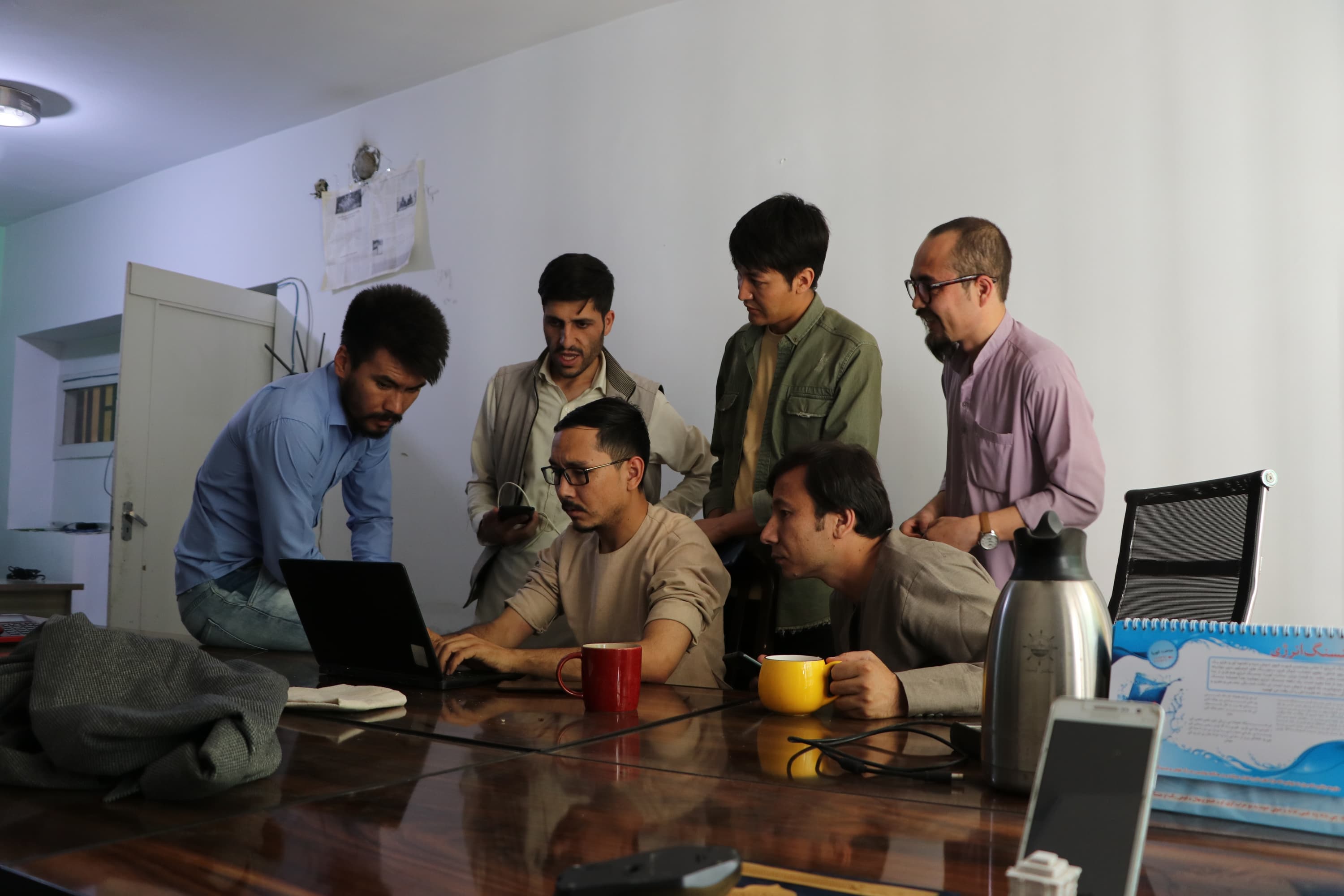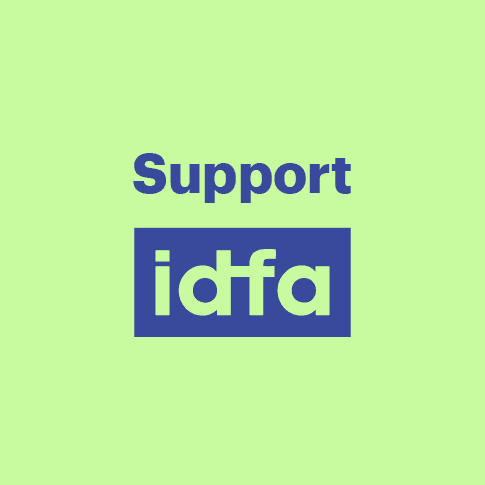
A close up of an overnight country: In conversation with Abbas Rezaie and Zaki Daryabi from The Etilaat Roz
On the 13th of August 2021, Editor in Chief Zaki Daryabi gathered his team for a meeting to prepare for a nation-wide collapse that was under way. He was not yet ready to abandon the newspaper he had built from scratch a decade ago. “First of all, Etilaat Roz here by no means would stop anyone if they individually chose to save themselves, their families, and friends and [decided] not to be a journalist anymore,” Zaki told his staff. Nevertheless, he insisted on keeping the newspaper active, even if it would be forced to operate outside Kabul.
Standing in a corner, Abbas Rezaie, a journalist and staff member, was recording the meeting with his handheld camera. He somehow forgot about the sound and only recorded the picture. Luckily, one of his colleagues saved him, he would learn later, by recording the sound separately and of his own accord. It was the first day of filming for Abbas, and difficult and uncertain times for Zaki and everyone else.
This moment is also the opening scene of the film The Etilaat Roz, which follows Zaki and his team as they navigate the new reality of a Taliban takeover of Afghanistan. Stuck in the middle of the upheaval, they face the difficult dilemma of choosing between their lives and their family’s safety on the one hand, and their profession as journalists on the other. For the next 100 minutes, a handheld, shaky camera wanders through the tiny office of the newspaper in the Kart-e se neighborhood of Kabul, an eye to record an unfolding historic moment.
A long poem before the collapse
“We predicted the collapse would happen on the 11th of September 2021. However, a few days before the August 13th meeting, I was filming a group of displaced people who entered northern Kabul when I felt strongly that the collapse was happening sooner than expected,” says Abbas.
Zaki had run into Abbas a few weeks before the collapse at a mutual friend’s dinner party. “Abbas was reading one of his long poems, a very long one that I felt even he was getting tired of when he reached the middle. A few days later, I saw him again in the street with his wife and his daughter. We greeted, and Abbas told me that he had an idea for the newspaper and that he wanted a camera.”
In August 2021, Abbas started filming a city on the verge of collapse and the people inside who faced an uncertain future, with the shadow of death all around them. Abbas was once told that a man's life was valued at only $400 on the streets of Kabul in those days.
With the aim to capture the stories outside the newspaper office, he wandered the neighborhoods of Kabul, from school bombing scenes in Dasht-e Barchi to the cafes of Pol e-sorkh. He was looking for characters to follow, and a window to the events that were unfolding around them. It wasn’t until the day of the meeting that he realized the story he was looking for was nowhere to be found but inside the office.
“Provinces were falling. I felt the need to record this collapse from a historical perspective. I was searching for characters and subjects when Zaki organized the meeting. I thought the best place to record and reflect on the collapse could be the office itself and the journalists who were on the frontline of this complicated situation. Their Hazara identity was also important for me,” says Abbas, himself a member of the persecuted community.
Cinema for history
When he started filming, Abbas, a poet, journalist, and avid reader, had long been obsessed with cinema and its ability to record history. He was already working on some experimental personal essay films on the theme, though he had never considered distribution for an international audience.
He credits his experience as a refugee in Iran as the starting point for his reflections on history through cinema. “I was a kid when my father took me to watch a film about the collapse of the communist regime. I was always curious about the history of the country. My father would tell us stories about the fall of King Zaher Shah and president Dawood and the communist parties of Khalq and Parcham. We listened to BBC reports about Mujahidin’s advance on Kabul and so on,” he says.
“Afghanistan is an overnight country. I saw on TV when the US and its allies entered the country in 2001. The bodies of the Taliban were lying on the roadsides, and people were looting their watches, money, and belongings. Kabul was a cruel city in those days. I always wanted to record such moments. I felt, this needs to be recorded.”
Zaki thought the same way. That’s the reason he welcomed Abbas, who wanted to film his own account of the collapse. “Kabul was packed with foreign journalists and filmmakers who were supposedly there to capture the withdrawal of the US and its allies. At times, when we were all anxious about our lives, the presence of numerous foreign journalists sent a message that something big was happening. But my real concern was about their reporting. They were trying to conclude the past 20 years and present a case study to the West. This is how it happened, they’d say,” explains Zaki.
Zaki didn’t have a clue he was the main character of the documentary that was being filmed in his office. At times he didn’t like the camera, which he describes as another burden during those terrifying weeks. He still has difficulty watching the film. “It’s too painful. One would think this all has finished now. But it hasn’t for me. I still feel close to that office and as if those days are still going on.”
At his screenings during IDFA, Abbas repeatedly said that his film is not an extreme long shot of Kabul but a close up. In no uncertain terms, The Etilaat Roz is indeed a close up of faces who become more worried, of life starting to dysfunction, of a country that is falling apart, of the main character, Zaki, whose morning routine of cigarettes and coffee becomes a metaphor for the last struggles to keep things together; the beaten-up bodies of journalists, an office that is becoming gradually empty, a shaky image of the very present, and the man behind the camera, who is the only staff member remaining in the office. It’s a portrayal of a fragmented reality.
The road to exile
Eventually, Abbas grew anxious that the city would sink into chaos, so he sent his family to Iran and stayed alone in a room that he calls “historic, very scary and strange.” Soon after, he moved into the newspaper office, but that didn’t help him overcome his anxiety. One thing that did help, though, was the camera. “It was like a buffer between me and the time and place—a trench, a shelter that kept me away from fear. The moment I turned it off, fear and anxiety would come along. I’d start to feel the dangerous times we were in.”
It was soon over for them. The Taliban arrested and severely tortured two journalists from the newspaper and started to pressure Zaki. Most of the staff members fled the country, and Zaki ultimately left as well. The office was shut down. The camera, however, remained on, as Abbas started to follow other characters: another close up of Kabul, another story. But it didn’t take long until he too was forced to leave, with a backpack full of hard drives and his camera, eventually landing in Iran, where he edited the film with his friends from the old days in Mashhad.
As Abbas and his editor, Pedram Yar, were struggling to render footage on a decade-old computer, little did they know the film would soon find its way to an international audience.
In September 2022, Abbas traveled to Seoul to attend the world premiere of The Etilaat Roz at the DMZ International Film Festival in South Korea. Shortly after the flight landed, he was informed about the positive result of his Covid test. By the time he left quarantine, the festival had already finished, and Abbas had missed the chance to watch his film with the audience on a big screen.
Nevertheless, it was just the beginning of Abbas’s new chapter, as the film was soon to have its European premiere at IDFA, where it won the Award for the Best First Feature.
As for Zaki, he resumed his morning coffee and cigarettes from the newspaper's new office near Washington DC, where he continues to report about Afghanistan.
“Our history has always been narrated from the ruler’s point of view. Whereas the people who change the course of history with their resilience, bravery, and sacrifices are not shown anywhere except in the newsreels. I want to get as close to the people as possible and continue recording their lives,” says Abbas, who is now living in a refugee camp near Utrecht, where his camera is still observing. “This time it’s a personal film, with lots of poetry and of course, history.”
